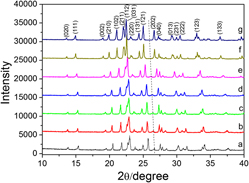Crossref Citations
This article has been cited by the following publications. This list is generated based on data provided by
Crossref.
Chen, Dongxia
Yuan, Baohe
Cheng, Yongguang
Ge, Xianghong
Jia, Yu
Liang, Erjun
and
Chao, Mingju
2016.
Phase transition and near-zero thermal expansion in ZrFeMo2VO12.
Physics Letters A,
Vol. 380,
Issue. 48,
p.
4070.
Chai Feng-Tao
Yue Ji-Li
Qiu Wu-Jie
Guo Hai-Bo
Chen Li-Jiang
and
Shi Si-Qi
2016.
Preparation and characterization of orthorhombic Fe2(MoO4)3 and first-principle study of its negative thermal expansion properties.
Acta Physica Sinica,
Vol. 65,
Issue. 5,
p.
056501.
Cheng, Yong-Guang
Mao, Yan-Chao
Liu, Xain-Sheng
Yuan, Bao-He
Chao, Ming-Ju
and
Liang, Er-Jun
2016.
Near-zero thermal expansion of In
2(1−
x
)
(HfMg)
x
Mo
3
O
12
with tailored phase transition
.
Chinese Physics B,
Vol. 25,
Issue. 8,
p.
086501.
Prisco, Luciana P.
Pontón, Patricia I.
Paraguassu, Waldeci
Romao, Carl P.
White, Mary Anne
and
Marinkovic, Bojan A.
2016.
Near-zero thermal expansion and phase transition in In0.5(ZrMg)0.75Mo3O12.
Journal of Materials Research,
Vol. 31,
Issue. 20,
p.
3240.
Chen, Dongxia
Yuan, Baohe
Yuan, Huanli
Ge, Xianghong
Guo, Juan
Liang, Erjun
and
Chao, Mingju
2018.
Phase transition and thermal expansion properties of Cr1.5-xScxZr0.5Mo2.5V0.5O12.
Ceramics International,
Vol. 44,
Issue. 8,
p.
9609.
Li, Sailei
Ge, Xianghong
Yuan, Huanli
Chen, Dongxia
Guo, Juan
Shen, Ruofan
Chao, Mingju
and
Liang, Erjun
2018.
Near-Zero Thermal Expansion and Phase Transitions in HfMg1−xZnxMo3O12.
Frontiers in Chemistry,
Vol. 6,
Issue. ,
Liu, Hongfei
Sun, Weikang
Zhang, Zhiping
Zhang, Xiuyun
Zhou, Yuxue
Zhu, Jun
and
Zeng, Xianghua
2019.
Tailored phase transition temperature and negative thermal expansion of Sc-substituted Al2Mo3O12synthesized by a co-precipitation method.
Inorganic Chemistry Frontiers,
Vol. 6,
Issue. 7,
p.
1842.
Liu, Hongfei
Sun, Weikang
Zhang, Zhiping
Lovings, La’Nese
and
Lind, Cora
2021.
Thermal Expansion Behavior in the A2M3O12 Family of Materials.
Solids,
Vol. 2,
Issue. 1,
p.
87.
Kee, Yongho
Suzuki, Yasuhiro
Ishigaki, Norikazu
Motoyama, Munekazu
Kimura, Yuta
Amezawa, Koji
and
Iriyama, Yasutoshi
2021.
An appropriate reference and counter electrode in an all-solid-state battery using NASICON-structured solid electrolyte.
Electrochemistry Communications,
Vol. 130,
Issue. ,
p.
107108.
Liang, Erjun
Sun, Qiang
Yuan, Huanli
Wang, Jiaqi
Zeng, Gaojie
and
Gao, Qilong
2021.
Negative thermal expansion: Mechanisms and materials.
Frontiers of Physics,
Vol. 16,
Issue. 5,
Tiwari, Ajay
Kakarla, D. Chandrasekhar
Hsieh, M.-J.
Lin, J.-Y
Wang, C. W.
Tseng, L. K.
Lu, C. E.
Pal, Arkadeb
Kuo, T. W.
Chou, Mitch M. C.
and
Yang, H. D.
2022.
Observation of magnetic field-induced second magnetic ordering and peculiar ferroelectric polarization in L-type ferrimagnetic
Fe2(MoO4)3.
Physical Review Materials,
Vol. 6,
Issue. 9,
Zhang, Zhiping
Zhang, Nan
and
liu, hongfei
2022.
Hydrothermal Synthesis of Flower-Like Sc2mo3o12 and its Investigation into Negative Thermal Expansion Property.
SSRN Electronic Journal ,
Hu, Yangming
Liu, Xiansheng
Wei, Wei
Yuan, Huanli
Zeng, Gaojie
Gao, Qilong
Guo, Juan
Chao, Mingju
and
Liang, Erjun
2022.
Expanding negative thermal expansion range of ZrMnMo3O12 to cover room temperature by introducing V5+.
Ceramics International,
Vol. 48,
Issue. 15,
p.
21125.
Zhang, Zhiping
Zhang, Nan
and
Liu, Hongfei
2023.
Hydrothermal synthesis of flower-like Sc2Mo3O12 and its investigation into negative thermal expansion property.
Ceramics International,
Vol. 49,
Issue. 11,
p.
17592.
Zhang, Zhiping
Zhang, Hang
Wang, Wei
Meng, Xiangdong
and
Liu, Hongfei
2023.
Phase transition and thermal expansion in W-substituted In2Mo3O12 ceramics.
Ceramics International,
Vol. 49,
Issue. 22,
p.
36825.
Hao, Xiangkai
Wang, Mengyue
Liu, Xiansheng
Cai, Yu
Xiang, Yumeng
Tian, Jianjun
Zhang, Feng
Zhang, Weifeng
Liang, Erjun
Li, Maozhi
and
Jia, Yu
2023.
High configurational entropy for low phase transition temperature and thermal expansion of A2M3O12 oxide ceramics.
Ceramics International,
Vol. 49,
Issue. 20,
p.
33051.
Balhara, Annu
Gupta, Santosh K.
Abraham, Malini
Yadav, Ashok Kumar
Jafar, Mohsin
and
Das, Subrata
2024.
Negative thermal expansion in Sc2Mo3O12:Sm3+ for white LEDs and unveiling the impact of phase transition on cryogenic luminescence.
Journal of Materials Chemistry C,
Vol. 12,
Issue. 31,
p.
11955.
Ding, Lifeng
Heng, Ben
Wang, Dawei
Zhu, Haikui
Wang, Lixi
Hou, Yi
Fu, Zhenxiao
and
Zhang, Qitu
2024.
Phase composition, crystal structures and enhanced microwave dielectric properties of Mg2+/Zr4+ co-doped Al2Mo3O12 ceramics.
Journal of Alloys and Compounds,
Vol. 997,
Issue. ,
p.
174918.
Chen, Dongxia
Yan, Xiaofei
Yang, Mengjie
Wang, Xianli
Fu, Linjie
Li, Mingyu
and
Yu, Zhanjun
2024.
Phase transition suppression, thermal and electrical properties of (YNb)0.2Zr0.6P2O7.
Ceramics International,
Vol. 50,
Issue. 24,
p.
55159.
Athira, P.
Tiwari, Ajay
Hsieh, M.-J.
Lin, J.-Y.
Puri, Nidhi
Wang, C.W.
Prashanth, C. H.
Dhanasekhar, C.
Huang, C.L.
Yang, H.D.
Jyothinagaram, Krishnamurthy
and
Kakarla, D. Chandrasekhar
2024.
Hidden magnetism, nonlinear magnetodielectric coupling, and large multicaloric effect in multiferroic
L
-type
Fe2(MoO4)3.
Physical Review Applied,
Vol. 21,
Issue. 5,
